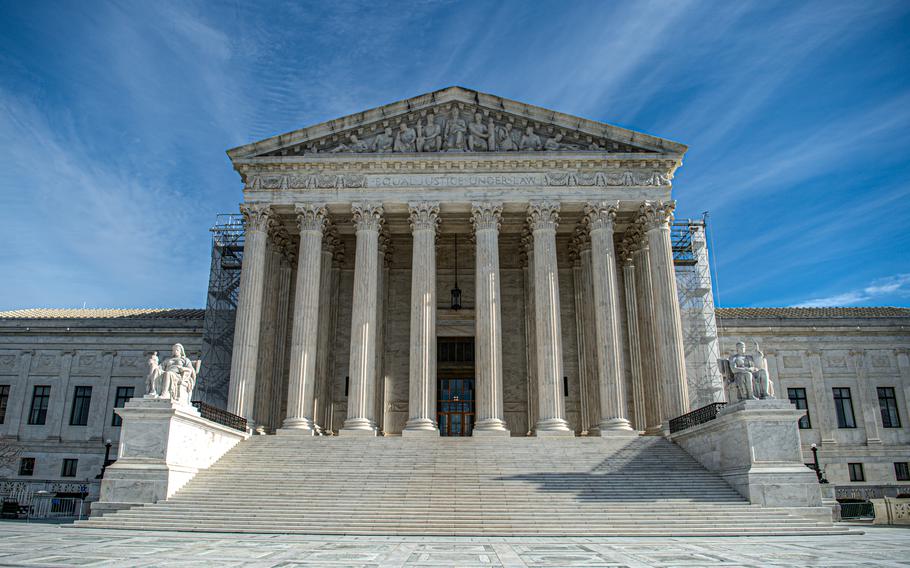Opinion
Absolute presidential immunity threatens national security
Special to Stars and Stripes April 24, 2024

The U.S. Supreme Court will decide whether the president is absolutely immune from criminal prosecution. (Carlos Bongioanni/Stars and Stripes)
A commander in chief who is exempt from the rule of law risks cascading harms to American democracy, national security and our leadership in the world. Those are the stakes as the Supreme Court considers whether the president is absolutely immune from criminal prosecution.
Those stakes are why we, along with 11 of our fellow retired four-star officers and service secretaries, submitted a brief to the Supreme Court. We appreciate the significance of military leaders speaking from experience on such matters, and decided to do so precisely for that reason: to ensure the justices fully appreciate the dangers of elevating the president above the law.
Civilian control of the military and the rule of law are bedrock democratic principles enshrined in the Constitution. The framers sought to balance a need for a standing peacetime military establishment with ensuring it could not be used as an instrument of domestic tyranny. Twenty-two of the 39 signers of the Constitution were veterans of the Revolutionary War, and it is inconceivable that they intended for the commander in chief to be held to a different standard than the troops he commands. As we wrote in our brief, “From the Founding to the present day, a steadfast commitment to these principles has successfully guided us through two world wars and numerous other conflicts; provided the stability needed for our democratic republic to flourish; and ensured that the military has the capacity to defend our nation by being trained to fight and win its wars. [Former President Donald Trump’s] theory of presidential immunity from criminal prosecution is an assault on these foundational commitments.”
We know firsthand that trust between political leaders and career uniformed military leaders is central to effective civilian control of the military and order in the ranks. That trust would be fatally undermined if the court grants the president an unprecedented carveout in the rule of law.
The president sits atop the military chain of command as the elected commander in chief, but his orders are transmitted by appointed civilian leaders to uniformed leaders who ultimately rely on enlisted service members to carry them out — without regard for politics or personal beliefs. Yet these service members also have a duty to disobey unlawful orders or else face criminal prosecution themselves. The importance of the underlying principle — that “just following orders” is not a defense to having committed crimes, even during war — was perhaps most poignantly illustrated during the Nuremberg trials following World War II as the Allied powers sought to impose accountability for Nazi atrocities.
Freeing a president from accountability under our criminal justice system — as absolute immunity would do — would threaten all of these principles by increasing the likelihood that a president would force service members to choose between following the president’s unlawful orders or following their duty to disobey all unlawful orders. Military personnel would continue to be legally accountable, even as they serve a president who is not. Inevitably, chaos and division across the ranks would follow.
Along the way, an unconstrained president issuing unlawful orders would undermine public confidence in the military, both in and out of the ranks, and drag our armed forces into the partisan political mud. It would undermine the key principle of military leadership to lead by example. This would all in turn impact morale, our continued viability as a democratic republic, and our standing as a leader and defender of the world’s democracies.
This is particularly so in the context of a criminal prosecution involving a sitting president’s unprecedented attempt to overturn a free and fair election amid a transition of power — a period of significant national security risk. For the court to wave through presidential action for personal partisan benefit that cannot be squared with the national interest would grant future authoritarian-minded presidents license to inflict lasting harms on our democracy with impunity.
And if the world sees that a president accused of leading a conspiracy to prevent a peaceful transfer of power cannot even be made to stand trial, much less be held accountable for crimes he may have committed, our example of self-government will be far less compelling.
There is far more than a former president’s future on the line. American democracy, its security and its credibility, both at home and abroad, are on the line as well.
George W. Casey Jr., a retired general, served as the 36th chief of staff of the Army. Louis E. Caldera served as the 17th secretary of the Army. Thad Allen, a retired admiral, served as the 23rd commandant of the Coast Guard. Carlton Fulford, a retired general, served as deputy commander in chief of the U.S. European Command. Deborah Lee James served as the 23rd secretary of the Air Force. Craig McKinley, a retired general, served as the 26th chief of the National Guard Bureau. Sean O’Keefe served as the 69th secretary of the Navy. John Jumper , a retired general, served as the 17th chief of staff of the Air Force. They are members of Count Every Hero, a nonpartisan initiative of retired admirals and generals and former service secretaries whose work focuses on promoting the importance of a strong democracy to national security; promoting civic literacy and civic participation; and protecting the voting rights of active-duty service members, veterans and their families.